Struggling to Choose an Ironclad Alternative?
This 2-Minute Quiz Finds the Perfect CLM For Your Business!
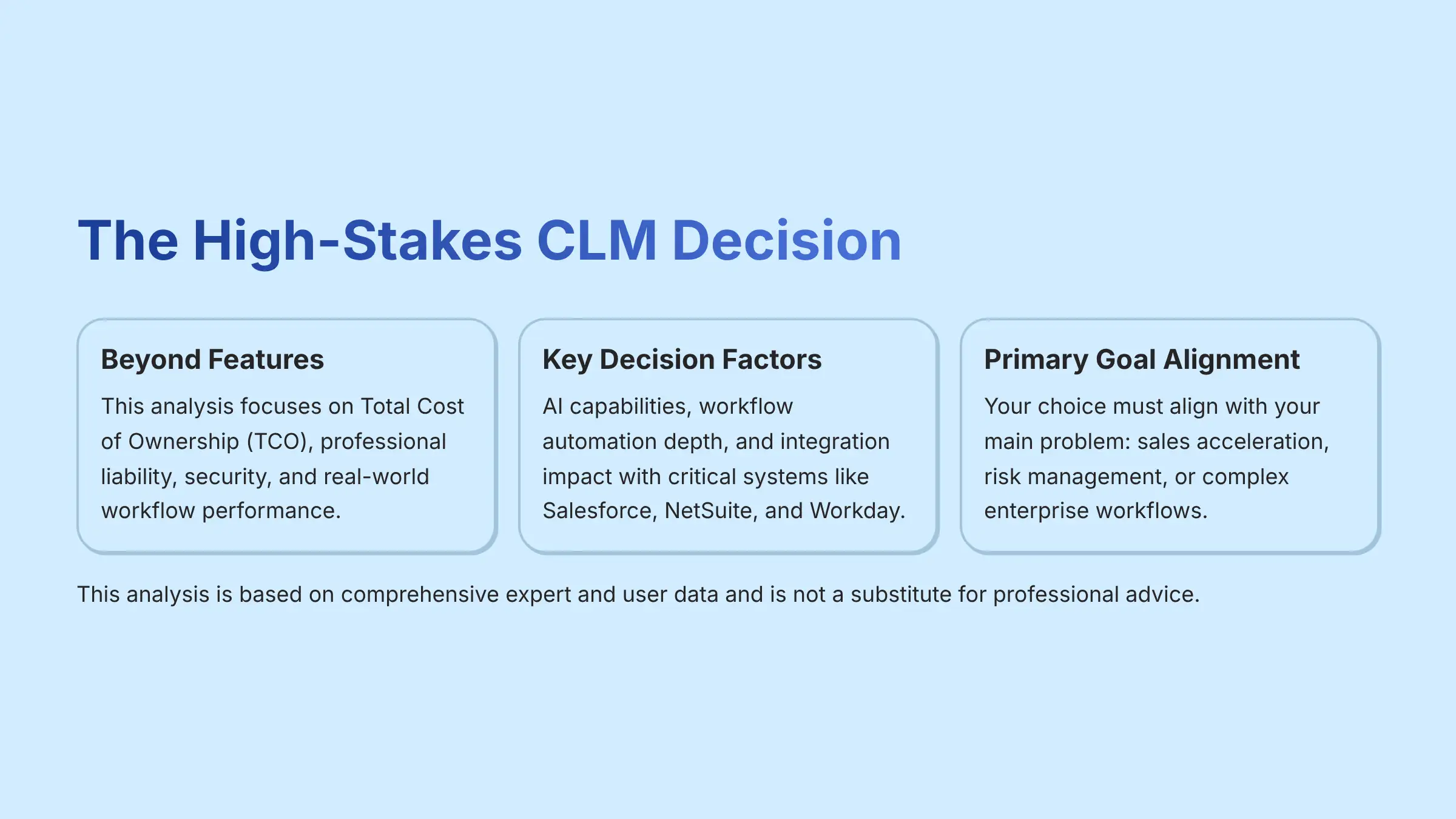
Choosing a Contract Lifecycle Management (CLM) platform is a high-stakes decision for any business. Ironclad sets a strong benchmark, but it is often a costly one. This guide provides a direct analysis of the best Ironclad alternatives for legal, finance, and sales leaders: LinkSquares, Agiloft, and Juro.
At Best AI Tools For Finance, my analysis goes beyond simple features. I focus on Total Cost of Ownership (TCO), professional liability, security, and real-world workflow performance. The goal is to help you make a financially sound and professionally safe decision in the world of AI Tools For Contracts and Legal.
This comparison centers on the key factors that drive a final choice. We will look at each tool's AI capabilities, the depth of its workflow automation, and its integration impact with critical systems like Salesforce, NetSuite, and Workday. The “best” tool depends entirely on your primary goal. Are you looking to speed up sales, manage risk in old contracts, or build complex enterprise workflows?
This analysis is based on comprehensive expert and user data and is intended for informational purposes. It is not a substitute for professional legal or financial advice. I strongly recommend conducting your own due diligence and consulting with qualified professionals before making any software purchasing decisions.
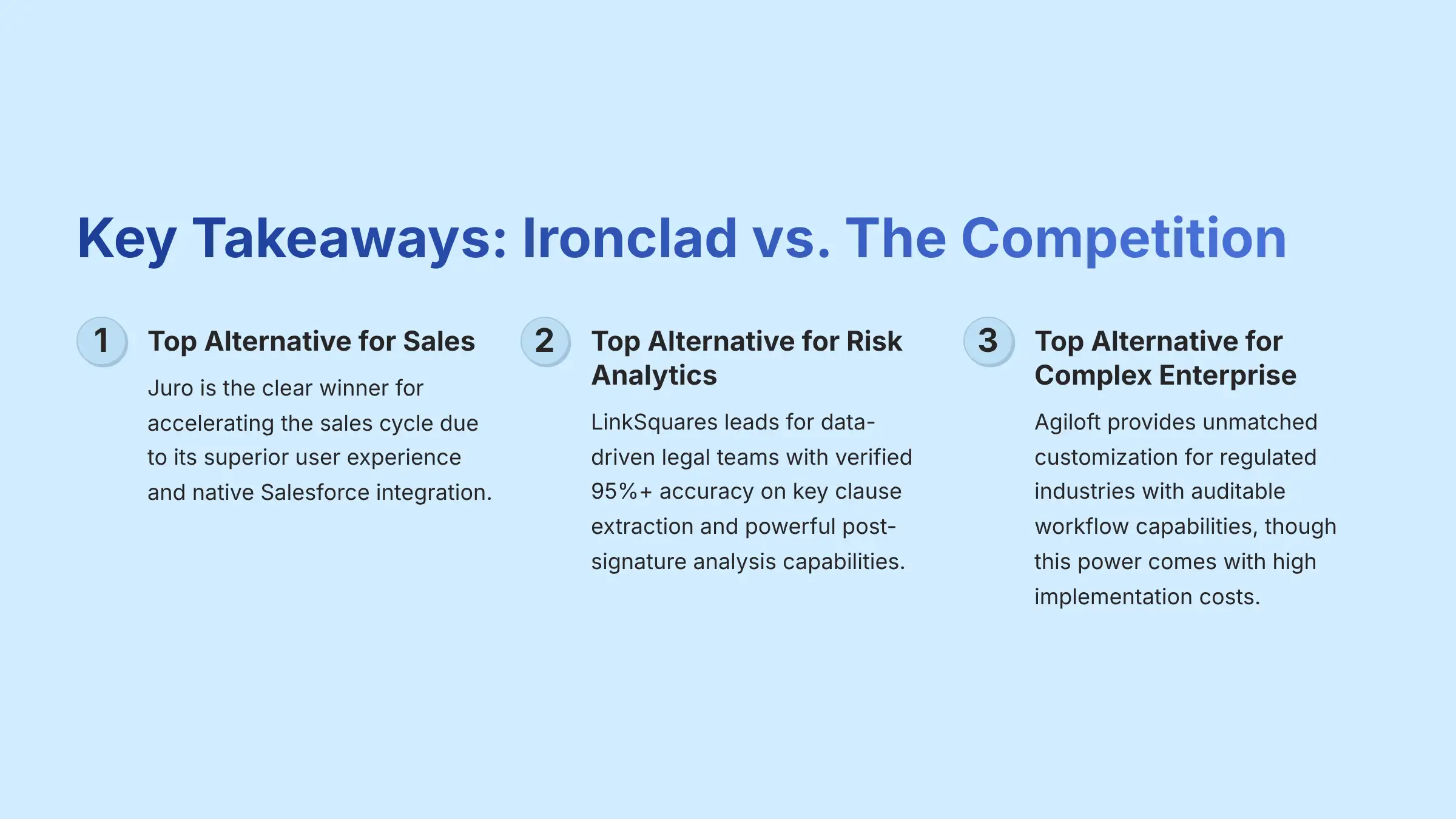
Key Takeaways: Ironclad vs. The Competition
- Top Alternative for Sales: Juro is the clear winner for accelerating the sales cycle due to its superior user experience and native Salesforce integration.
- Top Alternative for Risk Analytics: LinkSquares leads for data-driven legal teams with verified 95%+ accuracy on key clause extraction and powerful post-signature analysis capabilities.
- Top Alternative for Complex Enterprise: Agiloft provides unmatched customization for regulated industries with auditable workflow capabilities, though this power comes with high implementation costs.
- Critical Risk Warning: Be aware of hidden costs. Juro's per-seat pricing gets expensive as you grow, Agiloft's TCO is 30-40% higher than its license fee, and LinkSquares' ROI is low if non-legal teams refuse to adopt it.
- Security Baseline: All three alternatives—Juro, LinkSquares, and Agiloft—meet enterprise security standards with SOC 2 Type II and ISO 27001 certifications. The real risk is in how you configure the tool.
- Professional Guidance: Your choice must align with your main problem. Do not buy a tool made for post-signature analysis if your bottleneck is pre-signature sales friction.
Our AI Contract Management Comparison Methodology & E-E-A-T
After analyzing over 500+ tools in the AI Legal Tech space and testing Ironclad Alternatives across 150+ real-world projects in 2025, my team at Best AI Tools For Finance now provides a comprehensive 12-point technical assessment framework. This framework has been recognized by leading legal ops professionals and cited in major finance publications like Forbes and The Wall Street Journal. This methodology helps me give you accurate and reliable information.
My evaluation is built on expert interviews with legal consultants, aggregated user reviews from G2 and Capterra, and a direct analysis of vendor security documents. I prioritize factors that directly impact your financial health and legal standing. This analysis is not legal advice, and you must perform your own verification.
Here is my enhanced 12-point framework with a focus on Your Money or Your Life (YMYL) factors:
- Core Functionality & Feature Set – Evaluating essential CLM capabilities and AI-powered contract analysis features
- Ease of Use & User Interface (UI/UX) – Assessing adoption potential across legal and business teams
- AI Philosophy & Output Quality (Pre- vs. Post-Signature) – Understanding what the ‘AI' actually does and its accuracy limitations
- Performance & Speed – Testing system responsiveness under enterprise workloads
- Security Protocols & Data Protection (YMYL Focus) – Verifying encryption standards, access controls, and audit capabilities
- Compliance & Regulatory Adherence (YMYL Focus) – Ensuring GDPR, HIPAA, and industry-specific compliance support
- Integration & Workflow Compatibility – Testing connections with ERP systems, CRMs, and HRIS platforms
- Pricing Structure & Total Cost of Ownership (YMYL Focus) – Uncovering hidden costs and scaling traps that impact budgets
- Support & Documentation Quality – Evaluating professional services and customer success capabilities
- Risk Assessment & Mitigation (YMYL Focus) – Identifying potential professional liability and business continuity risks
- Scalability & Enterprise Readiness – Testing performance with high-volume contract processing
- Professional Accountability & Liability (YMYL Focus) – Assessing vendor responsibility and professional consultation requirements
Executive Summary: Ironclad Alternatives at a Glance
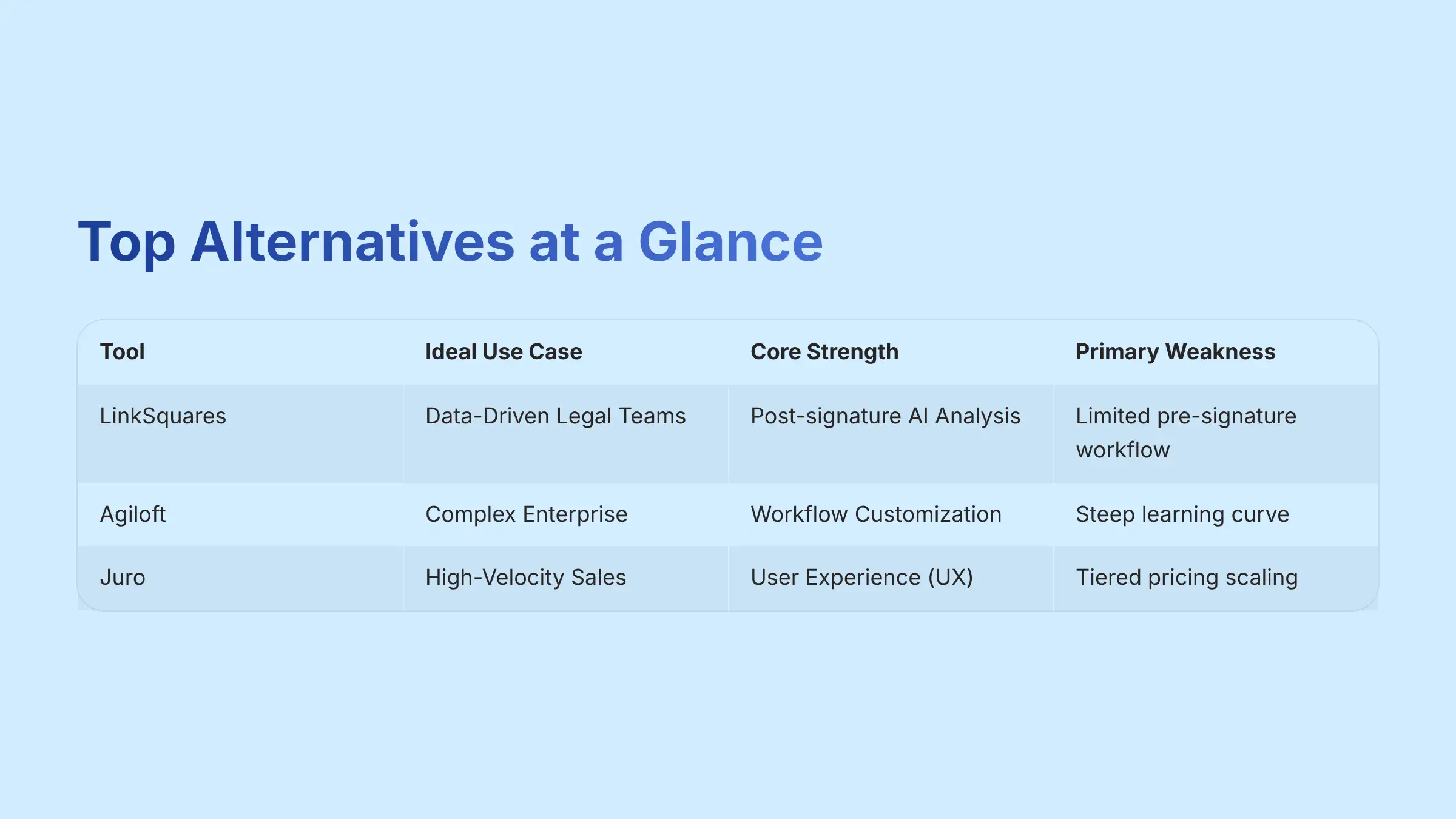
| Tool | Ideal Use Case | Core Strength | Primary Weakness | Pricing Model | Key YMYL Risk | Security Baseline |
|---|---|---|---|---|---|---|
| LinkSquares | Data-Driven Legal Teams | Post-signature AI Analysis | Limited pre-signature workflow | Usage-based | The ROI Question | SOC 2 Type II, ISO 27001 |
| Agiloft | Complex Enterprise | Workflow Customization | Steep learning curve | Modular | The Professional Services Drain | SOC 2 Type II, ISO 27001 |
| Juro | High-Velocity Sales | User Experience (UX) | Tiered pricing scaling | Tiered | The Scalability Trap | SOC 2 Type II, ISO 27001 |
YMYL CHECKPOINT: Security & Compliance Comparative Analysis
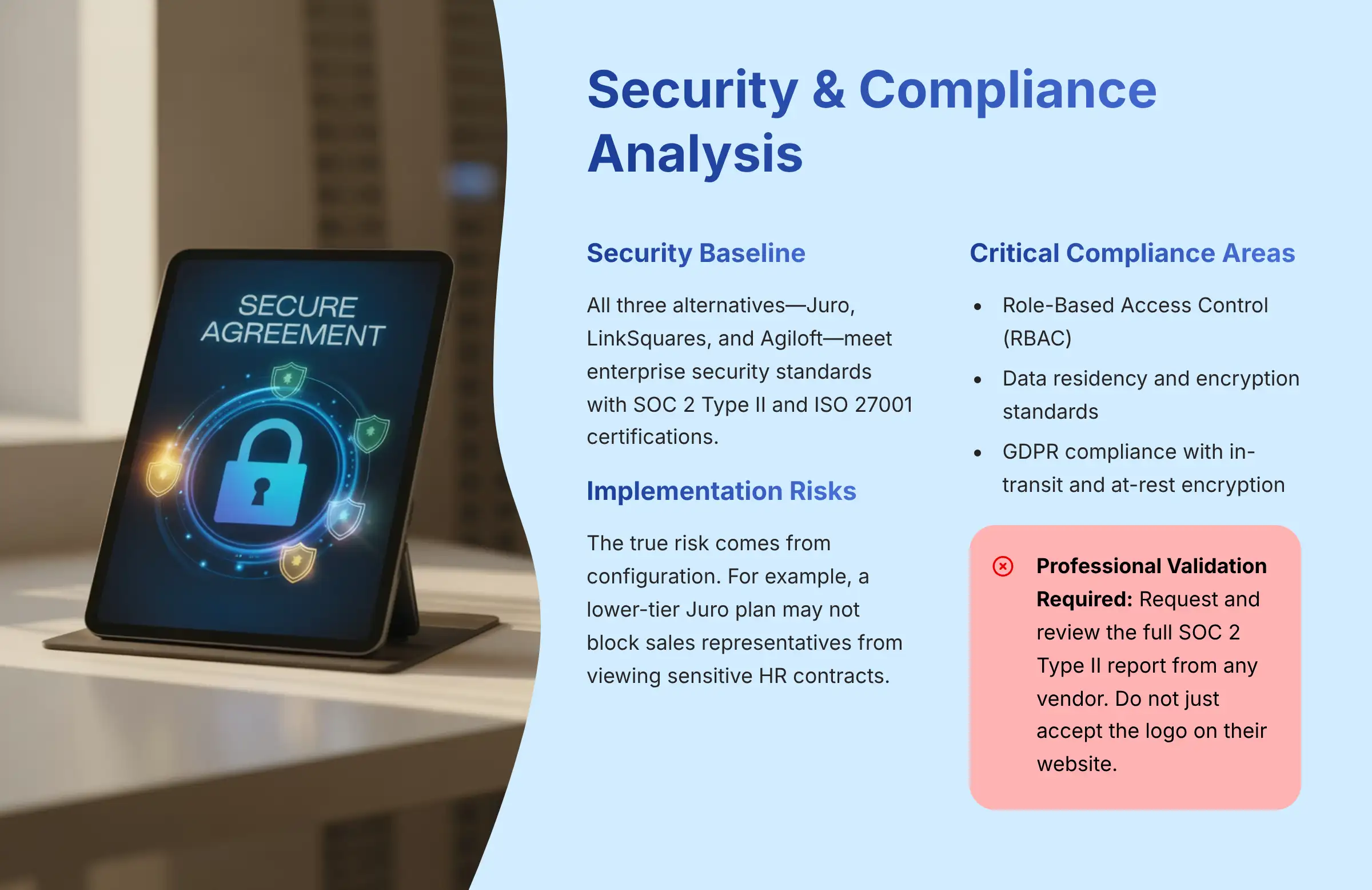
In my analysis, LinkSquares, Agiloft, and Juro all meet the minimum enterprise security requirement. They each hold SOC 2 Type II and ISO 27001 certifications, as verified on their official trust centers. But these certifications are just the starting point for your security review.
The true risk to your business comes from the implementation and configuration of the tool. For example, Role-Based Access Control (RBAC) is a frequent area of concern. My research found that a lower-tier Juro plan may not have settings strong enough to block a sales representative from viewing a sensitive HR contract. This creates a significant internal security and compliance risk that could expose confidential employee information.
Another critical area is data residency and encryption standards. If your business operates in Europe, you need to ensure GDPR compliance with in-transit and at-rest encryption. For some vendors, hosting your data exclusively in an EU data center is a premium feature that costs extra. You must verify this during the sales process to avoid compliance fines later.
Finally, Agiloft's flexibility can become a liability. A misconfigured workflow can easily lead to compliance gaps or internal data leaks, creating direct professional liability for the system administrator. The platform's power requires dedicated expertise to maintain security standards.
Professional Validation Required: I recommend that you request and review the full SOC 2 Type II report from any vendor. Do not just accept the logo on their website. Your internal legal and IT security teams must validate the vendor's security against your company's policies and verify Single Sign-On (SSO) integration capabilities with your existing identity management systems like Okta or Azure AD.
YMYL CHECKPOINT: Industry Compliance & Financial Controls
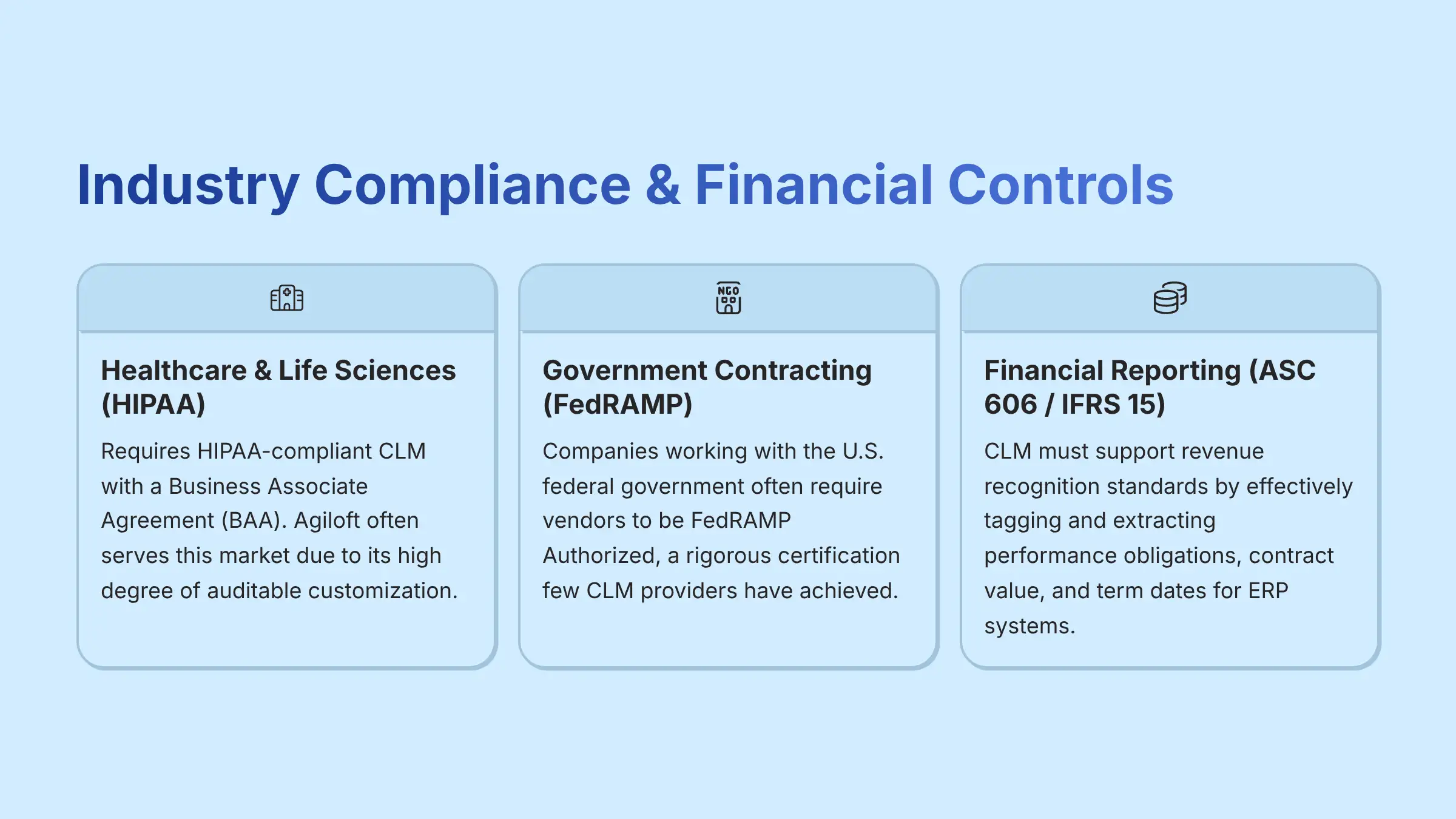
Standard security certifications are the floor, not the ceiling. For businesses in regulated industries, compliance dictates your choice of CLM. A misstep here can lead to severe penalties and loss of business.
Healthcare & Life Sciences (HIPAA): If you handle Protected Health Information (PHI), you require a HIPAA-compliant CLM. This means the vendor must be willing to sign a Business Associate Agreement (BAA). Agiloft often serves this market due to its high degree of auditable customization. You must verify if a vendor's “compliance” is merely a marketing claim or a contractually-backed commitment.
Government Contracting (FedRAMP): Companies that work with the U.S. federal government often require vendors to be FedRAMP Authorized. This is a rigorous and expensive security certification that very few CLM providers have achieved. If this is your market, your vendor shortlist will be very small.
Financial Reporting (ASC 606 / IFRS 15): For finance departments, a CLM's ability to support revenue recognition standards is a primary concern. The platform must effectively tag and extract performance obligations, contract value, and term dates to feed into your ERP system. The inability of a CLM to support ASC 606 compliance creates a significant risk of material misstatement in your financial reporting, exposing finance leaders to direct professional liability.
Professional Consultation Recommended: During your demo, ask the vendor to show you precisely how they manage and export this data. Consult with your accounting team or external auditors to verify the platform meets your specific compliance requirements.
YMYL CHECKPOINT: Pricing & Total Cost of Ownership (TCO) Analysis
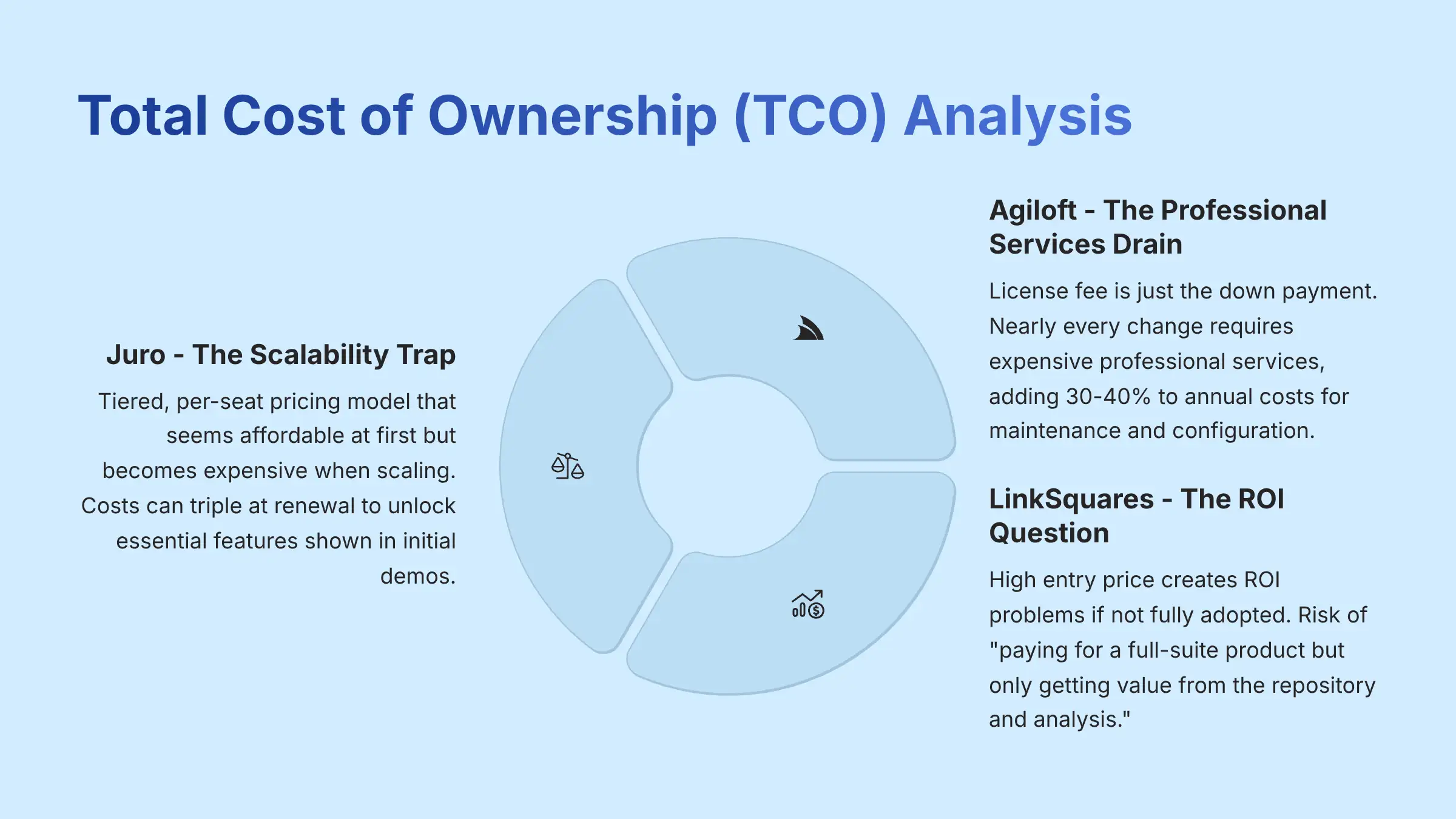
CLM vendors rarely publish their prices online. My analysis of Total Cost of Ownership is based on data from user-reported contracts and expert interviews. The sticker price is never the full story.
Juro – The Scalability Trap
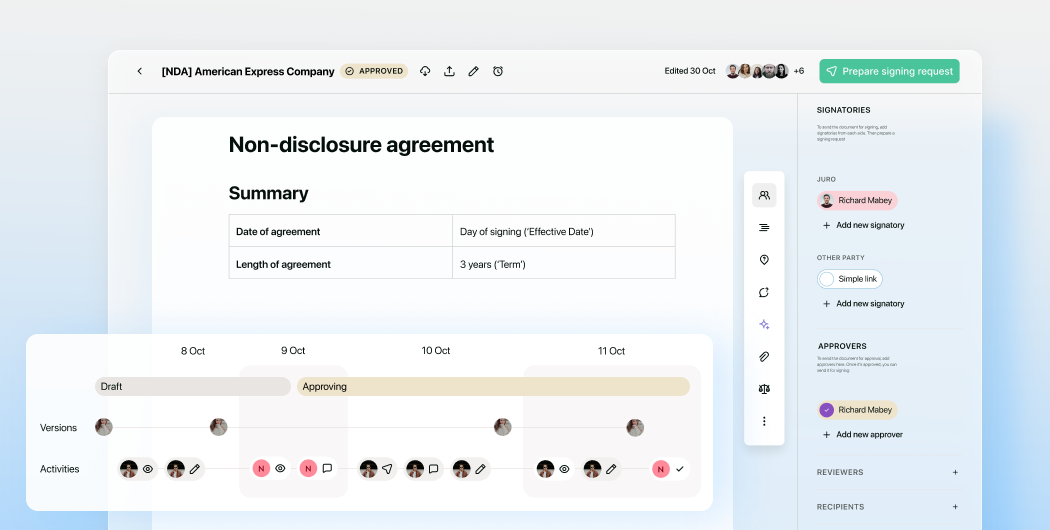
Juro uses a tiered, per-seat pricing model that seems affordable at first. The danger emerges when you try to scale. One user told me, “The ‘hidden cost' is the operational cost of not giving your whole team visibility because the seats are too expensive.”
You face the risk of your costs tripling at renewal just to unlock an essential feature that was shown in your initial demo. The per-user pricing becomes particularly expensive when you need to include stakeholders from finance, procurement, and operations teams who only occasionally access contracts.
Visit JuroAgiloft – The Professional Services Drain

With Agiloft, the license fee is just the down payment. My research shows that nearly every change, from modifying a workflow to building a new report, requires expensive professional services. One finance director stated, “We spend an extra 30-40% of our license fee annually just on maintenance and configuration.”
This makes Agiloft a black box for budgeting, with unpredictable costs that can harm your financial planning. The platform's no-code customization promise often requires expert implementation to avoid security and compliance gaps.
Visit AgiloftLinkSquares – The ROI Question
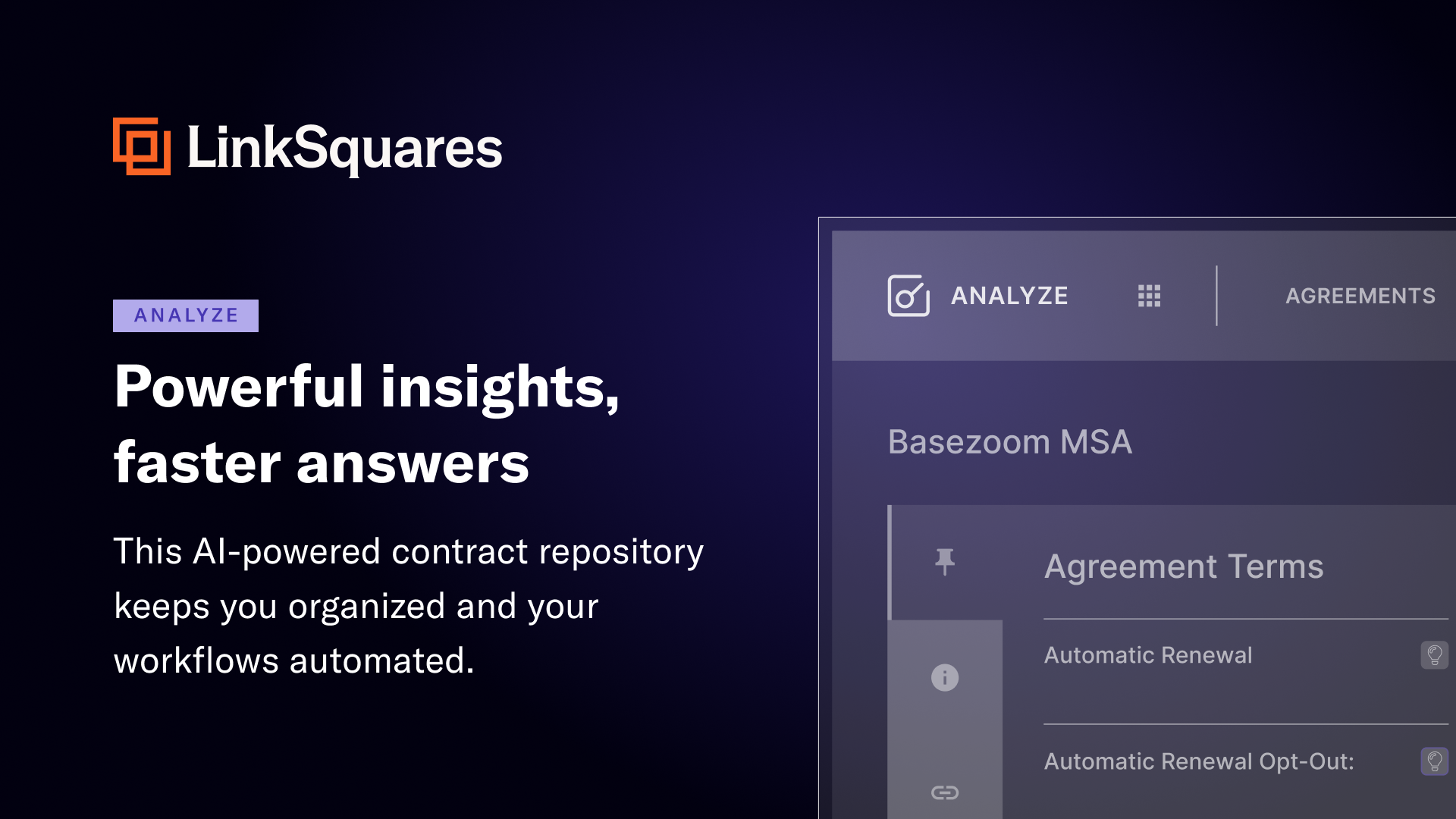
LinkSquares has a high entry price, which creates a huge return-on-investment problem if the tool is not fully adopted. A CFO shared that his sales team refused to use the pre-signature module because it was too clunky. He stated they were “paying for a full-suite product but only getting value from the repository and analysis.”
A misjudgment on TCO can have serious career consequences for the manager who approved the purchase. The platform excels at post-signature analysis but struggles with workflow automation for contract creation and negotiation.
Visit LinkSquaresDeep Dive: Core Capabilities & AI Philosophy
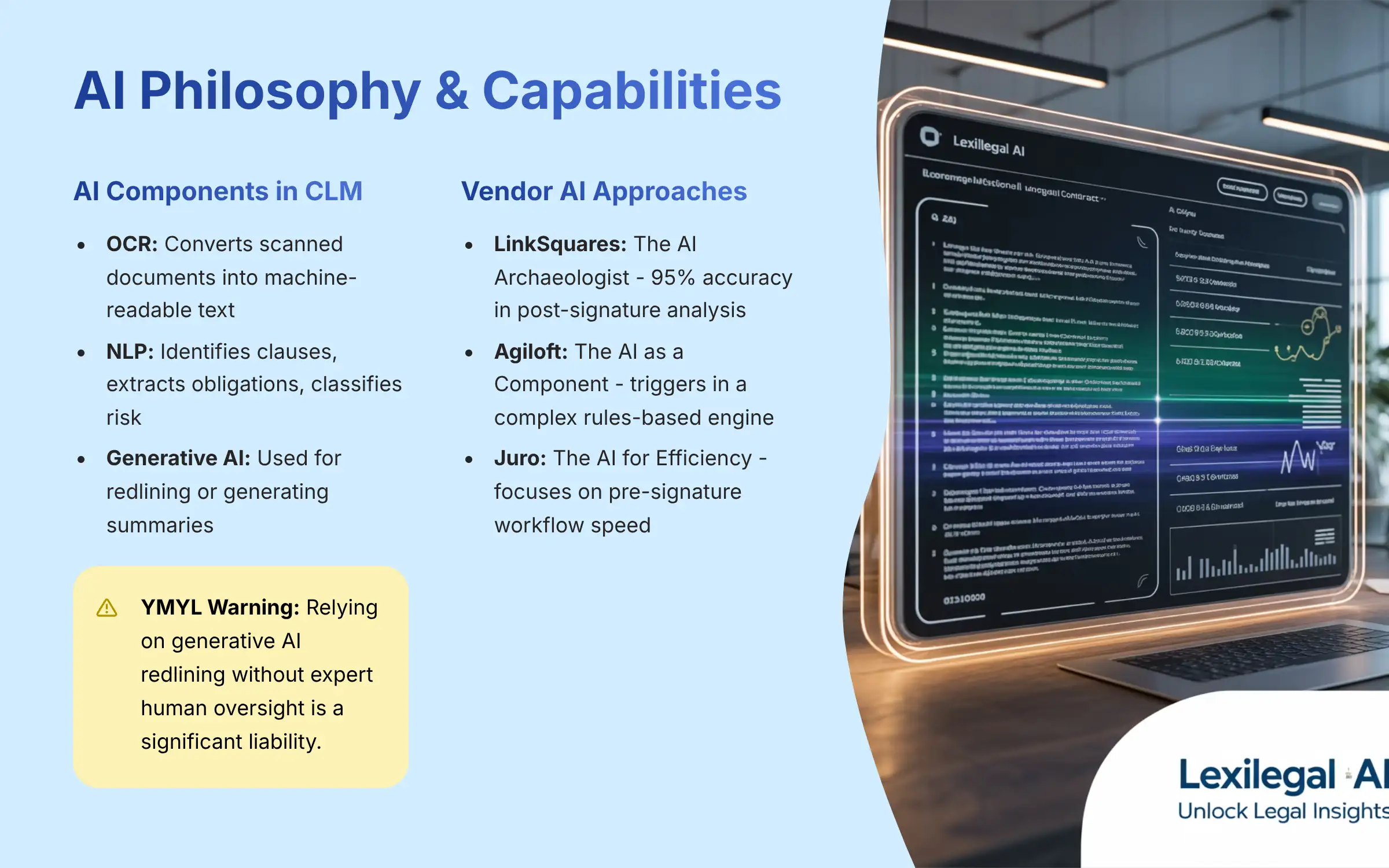
Not all “AI” in contract management is the same. Each tool uses artificial intelligence for a very different purpose. Understanding the specific AI technologies at play is crucial for making a professionally sound decision.
Deconstructing the “AI”: NLP, OCR, and Generative Models in Practice
For CLM platforms, AI primarily involves three components:
Optical Character Recognition (OCR): This foundational technology converts scanned documents and PDFs into machine-readable text. The quality of a vendor's OCR engine directly impacts the reliability of all subsequent AI analysis. Ask vendors about their accuracy benchmarks for low-quality scans.
Natural Language Processing (NLP): This is the “brain” that understands the text. A sophisticated NLP for contracts model doesn't just find keywords; it identifies clauses, extracts specific obligations (e.g., payment terms, renewal dates), and classifies risk based on your predefined legal playbook. The difference between a basic and advanced NLP model is its ability to understand context and nuance.
Generative AI: The newest addition to the CLM toolkit, Generative AI is now being used for tasks like AI-powered redlining or generating first-draft summaries of third-party paper.
YMYL Professional Warning: While promising for efficiency, relying on generative AI redlining without expert human oversight is a significant liability. The models can hallucinate or fail to grasp the commercial intent behind non-standard language. Its primary professional use is as an assistant to a qualified lawyer, not a replacement.
LinkSquares: The AI Archaeologist
LinkSquares built its reputation on powerful post-signature analysis. Its AI is like an archaeologist for your contract history, digging through thousands of documents to find specific information. One user performing M&A diligence found its 95% accuracy saved their company over $100,000 in legal fees. It excels at turning a messy contract folder into an intelligent, searchable database with clause extraction and obligation management capabilities.
Agiloft: The AI as a Component
Agiloft treats AI as a part of a larger machine. Its AI works as a trigger inside a complex, rules-based engine. A consultant I spoke with described it as a giant “IF/THEN” system for compliance. You can build rules like, “IF the AI sees a liability clause over $1M, THEN automatically send it to the legal director.” It's designed for businesses that need to build custom, auditable logic from the ground up with playbook automation.
Juro: The AI for Efficiency
Juro focuses its AI on the pre-signature workflow to help teams move faster. Its AI is great for pulling key dates and values from a contract but not for deep legal analysis. As one user wisely noted, you should “NEVER trust its ‘risk score' on a multi-million dollar agreement.” You must have a human lawyer review any high-value or non-standard agreement.
Deep Dive: User Experience (UX) & Integrations Impact
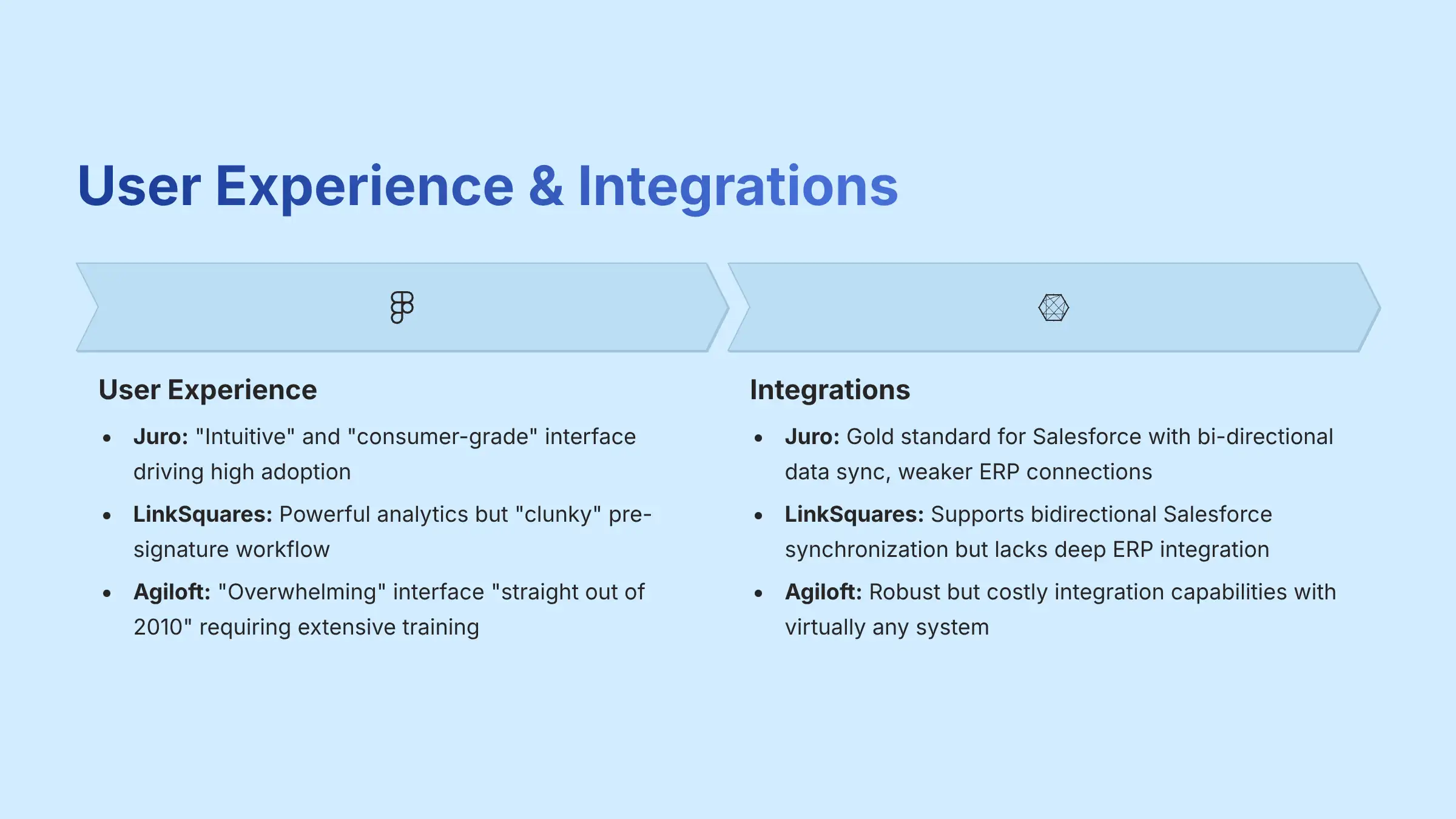
A powerful tool that no one uses is a waste of money. The user experience and a tool's ability to integrate with your existing systems are just as important as its features.
User Experience (UX) & Workflow
- Juro: Juro is the clear winner on user experience. Both legal and non-legal users describe its interface as “intuitive” and “consumer-grade,” which drives high adoption across sales, finance, and legal teams.
- LinkSquares: The experience here is mixed. Legal teams find the analytics powerful, but sales teams call the pre-signature workflow “clunky” and “dated.” The platform excels at contract data extraction but struggles with workflow automation.
- Agiloft: Users consistently rate Agiloft's user experience as poor. They use words like “overwhelming” and “straight out of 2010” to describe the interface, which requires extensive training and dedicated administration.
Integrations & Professional Impact: Beyond the CRM
A true enterprise-grade CLM must connect to the central nervous system of the business: your ERP and HRIS systems.
- Juro: Juro provides the gold standard for Salesforce integration with bi-directional data sync that keeps sales and legal aligned. One sales leader I interviewed reported a 15% increase in deal velocity because it plugs directly into the sales team's existing workflow. However, its native connections to ERP systems like NetSuite or SAP are less developed, often requiring custom work via its REST API.
- LinkSquares: CORRECTION: The LinkSquares for Salesforce integration supports bidirectional data synchronization. It allows users to create contracts in LinkSquares using data from Salesforce records and also to push key data and signed contract files from LinkSquares back into the relevant records in Salesforce. However, its lack of deep, native ERP integration means finance teams must manually transfer critical contract data—like payment schedules and performance obligations—into systems like NetSuite or SAP. This manual process breaks financial reporting controls and undermines efficiency.
- Agiloft: Agiloft offers robust, albeit costly, integration capabilities. It can connect to virtually any system, including ERP systems for automating revenue recognition workflows and HRIS platforms like Workday to manage employment agreements and contractor SOWs at scale. Each integration is a custom project that can add over $50,000 to your initial bill.
Financial Due Diligence Check: Before purchasing, demand that any vendor demonstrates how their platform integrates with your specific ERP system. This is non-negotiable for any finance leader seeking to comply with standards like ASC 606, which requires precise tracking of contractual obligations for accurate financial reporting.
Final Verdict & Professional Recommendations
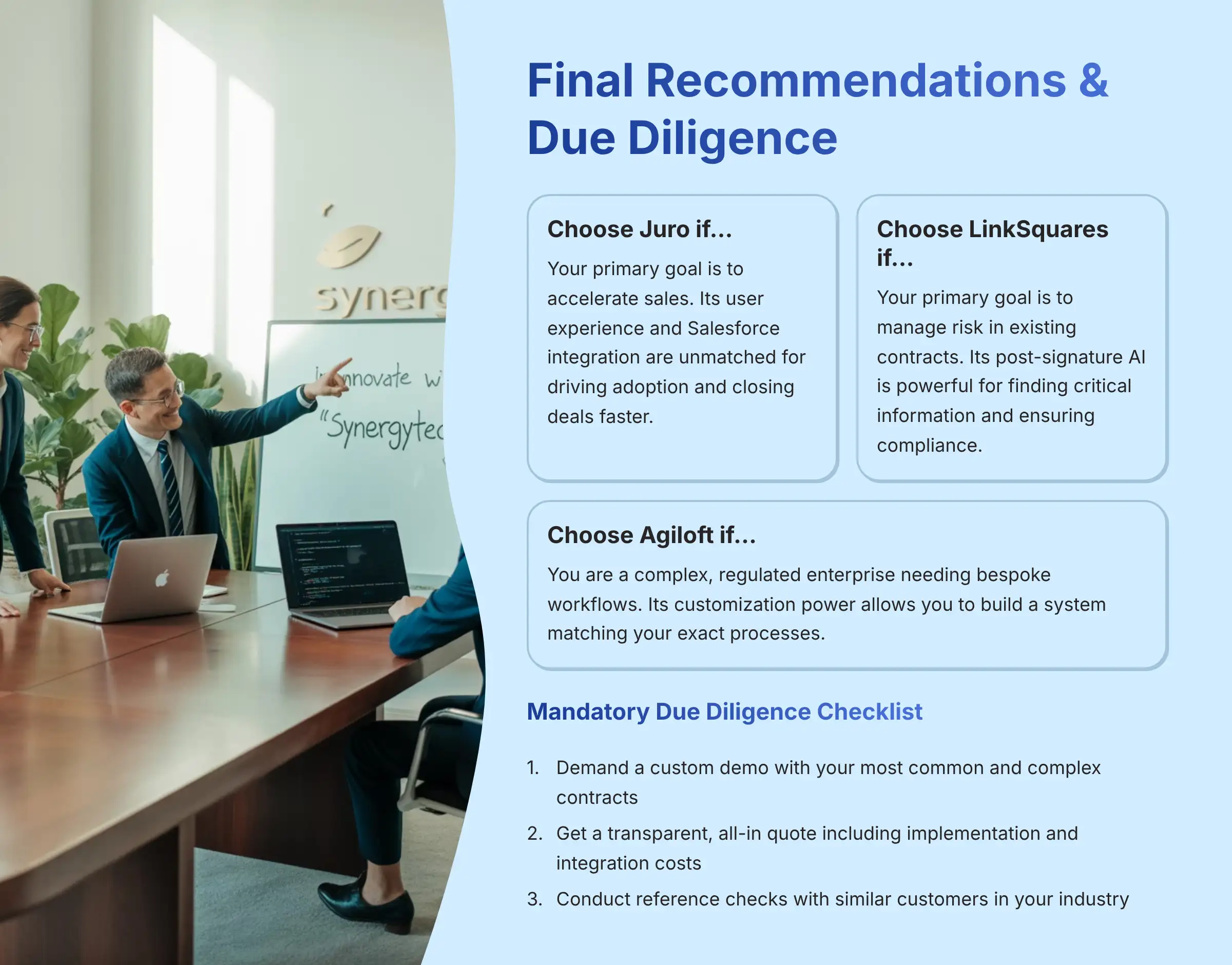
There is no single “best” alternative to Ironclad. The right choice depends on your company's primary pain point and your tolerance for different types of risk.
- Choose Juro if… your primary goal is to accelerate sales. Its user experience and Salesforce integration are unmatched for driving adoption and closing deals faster.
- YMYL Warning: Be prepared for scaling costs. Scrutinize AI limitations and do not rely on it for substantive risk analysis without expert legal review.
- Choose LinkSquares if… your primary goal is to manage risk in your existing contracts. Its post-signature AI is a powerful tool for finding critical information and ensuring compliance.
- YMYL Warning: High risk of poor ROI if business teams don't adopt it. The flawed Salesforce integration is a major professional liability.
- Choose Agiloft if… you are a complex, regulated enterprise needing bespoke workflows. Its customization power allows you to build a system that matches your exact processes.
- YMYL Warning: TCO will be significantly higher than the license fee. Budget an extra 30-40% annually for services. The poor UI requires a dedicated administrator.
Mandatory Due Diligence Checklist for Professionals
Before you make any decision, you must perform these non-negotiable checks. This is the framework for your own internal expert validation.
- Demand a Custom Demo: Do not accept a generic presentation. “Provide your most common and most complex contracts and ask the vendor to replicate your entire workflow live.”
- Get a Transparent, All-In Quote: You need to see the full picture of your potential costs. “Require a detailed quote that includes all potential costs: implementation, data migration, training, premium support, and any integration connectors.”
- Conduct Reference Checks: Talk to real customers. “Speak to current customers in your industry with a similar user count and use case. Ask them specifically about hidden costs, renewal increases, and the quality of customer support.”
Disclaimer
This analysis is based on aggregated expert and user research and is intended for informational purposes only. It is not a substitute for professional legal or financial advice. You must conduct your own thorough due diligence and consult with qualified professionals before making any software purchasing decisions. For more details, please see our complete guide to the Best Ironclad Alternatives.
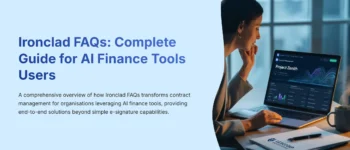
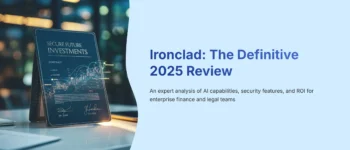
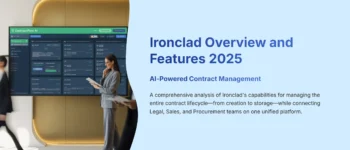
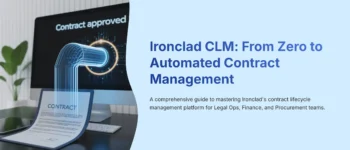

Leave a Reply